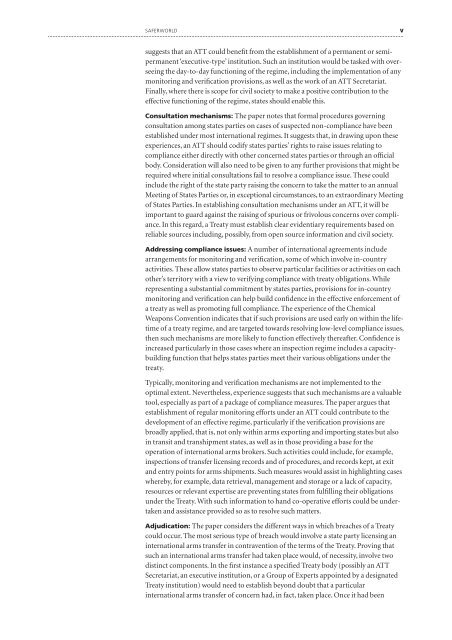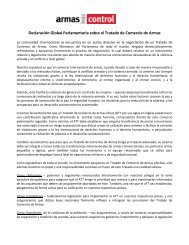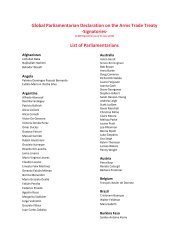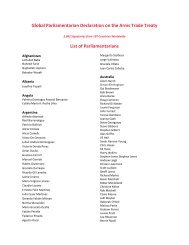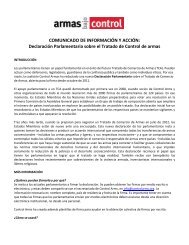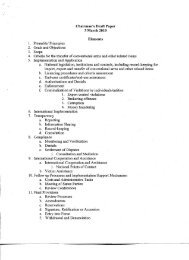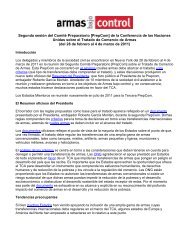Making it Work - Control Arms
Making it Work - Control Arms
Making it Work - Control Arms
- No tags were found...
Create successful ePaper yourself
Turn your PDF publications into a flip-book with our unique Google optimized e-Paper software.
SAFERWORLDvsuggests that an ATT could benef<strong>it</strong> from the establishment of a permanent or semipermanent‘executive-type’ inst<strong>it</strong>ution. Such an inst<strong>it</strong>ution would be tasked w<strong>it</strong>h overseeingthe day-to-day functioning of the regime, including the implementation of anymon<strong>it</strong>oring and verification provisions, as well as the work of an ATT Secretariat.Finally, where there is scope for civil society to make a pos<strong>it</strong>ive contribution to theeffective functioning of the regime, states should enable this.Consultation mechanisms: The paper notes that formal procedures governingconsultation among states parties on cases of suspected non-compliance have beenestablished under most international regimes. It suggests that, in drawing upon theseexperiences, an ATT should codify states parties’ rights to raise issues relating tocompliance e<strong>it</strong>her directly w<strong>it</strong>h other concerned states parties or through an officialbody. Consideration will also need to be given to any further provisions that might berequired where in<strong>it</strong>ial consultations fail to resolve a compliance issue. These couldinclude the right of the state party raising the concern to take the matter to an annualMeeting of States Parties or, in exceptional circumstances, to an extraordinary Meetingof States Parties. In establishing consultation mechanisms under an ATT, <strong>it</strong> will beimportant to guard against the raising of spurious or frivolous concerns over compliance.In this regard, a Treaty must establish clear evidentiary requirements based onreliable sources including, possibly, from open source information and civil society.Addressing compliance issues: A number of international agreements includearrangements for mon<strong>it</strong>oring and verification, some of which involve in-countryactiv<strong>it</strong>ies. These allow states parties to observe particular facil<strong>it</strong>ies or activ<strong>it</strong>ies on eachother’s terr<strong>it</strong>ory w<strong>it</strong>h a view to verifying compliance w<strong>it</strong>h treaty obligations. Whilerepresenting a substantial comm<strong>it</strong>ment by states parties, provisions for in-countrymon<strong>it</strong>oring and verification can help build confidence in the effective enforcement ofa treaty as well as promoting full compliance. The experience of the ChemicalWeapons Convention indicates that if such provisions are used early on w<strong>it</strong>hin the lifetimeof a treaty regime, and are targeted towards resolving low-level compliance issues,then such mechanisms are more likely to function effectively thereafter. Confidence isincreased particularly in those cases where an inspection regime includes a capac<strong>it</strong>ybuildingfunction that helps states parties meet their various obligations under thetreaty.Typically, mon<strong>it</strong>oring and verification mechanisms are not implemented to theoptimal extent. Nevertheless, experience suggests that such mechanisms are a valuabletool, especially as part of a package of compliance measures. The paper argues thatestablishment of regular mon<strong>it</strong>oring efforts under an ATT could contribute to thedevelopment of an effective regime, particularly if the verification provisions arebroadly applied, that is, not only w<strong>it</strong>hin arms exporting and importing states but alsoin trans<strong>it</strong> and transhipment states, as well as in those providing a base for theoperation of international arms brokers. Such activ<strong>it</strong>ies could include, for example,inspections of transfer licensing records and of procedures, and records kept, at ex<strong>it</strong>and entry points for arms shipments. Such measures would assist in highlighting caseswhereby, for example, data retrieval, management and storage or a lack of capac<strong>it</strong>y,resources or relevant expertise are preventing states from fulfilling their obligationsunder the Treaty. W<strong>it</strong>h such information to hand co-operative efforts could be undertakenand assistance provided so as to resolve such matters.Adjudication: The paper considers the different ways in which breaches of a Treatycould occur. The most serious type of breach would involve a state party licensing aninternational arms transfer in contravention of the terms of the Treaty. Proving thatsuch an international arms transfer had taken place would, of necess<strong>it</strong>y, involve twodistinct components. In the first instance a specified Treaty body (possibly an ATTSecretariat, an executive inst<strong>it</strong>ution, or a Group of Experts appointed by a designatedTreaty inst<strong>it</strong>ution) would need to establish beyond doubt that a particularinternational arms transfer of concern had, in fact, taken place. Once <strong>it</strong> had been


